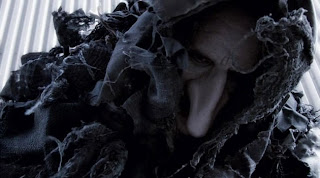Monday, March 28, 2011
"Almost Famous" Review
Though “Almost Famous” deals with “sex, drugs and rock n’ roll” it manages to show it in a sweet and nostalgic way. Sure, the people may be crazy, but there’s something about them that you can’t help but find endearing. Writer/director Cameron Crowe has managed to capture a place in time, clean it up just enough, and put it on display as a comforting coming of age tale. Sure, it may not be the deeply meaningful picture one gets the sense Crowe might have sought to direct, but it shines in its comedy and feel-good musical moments.
“Almost Famous” is the story of William Miller, an ostracized and sheltered high schooler who has a passion for music. After finding out that he’s two years younger than he always thought he was, he decides to pitch a story to Rolling Stone about the up-and-coming band Stillwater. Rolling Stone decides to take a chance on him, so our young journalist packs his bag and hits the road with what will eventually become one of the biggest bands in the country.
Patrick Fugit delivers a wide-eyed performance as William, and is saved by the much more talented actors he is put on screen with. Billy Crudup as the affable lead guitarist Russell Hammond brings just a bit of danger to the world, while Kate Hudson, as “band-aid” Penny Lane, shines in a way Hudson since hasn’t. But what’s really impressive is the amount of talented character actors that populate the smaller roles in the story, all delivering interesting (though many times, all too short) performances. Philip Seymour Hoffman, Rainn Wilson, Jimmy Fallon, Fairuza Balk and Anna Paquin all pop up, adding a comedic and emotional depth the film would otherwise be lacking without them, and Frances McDormand in particular delivers a hilarious turn as William’s outrageously overprotective mother.
Maybe it’s just because rock n’ roll craziness has been talked about so much, or perhaps Crowe doesn’t want to inadvertently offend any of his old buddies, but the film is at its weakest when it strays to the topic of the musician’s private lives. Sure, Crowe has fun at their expense but he never goes for the jugular, preferring instead awkward comedy or heartwarming drama. Cameron is a director who shines when he can explore characters that are just a bit larger than life (“Jerry Maguire,” “Vanilla Sky”) and “Almost Famous” gives him a wonderful opportunity to do just that.
Monday, March 7, 2011
"Ink" Revised Review
Rather than relocate to Los Angeles or New York, as a majority of filmmakers do, Jamin Winans has decided to bring the movie industry to his hometown. Along with a ragtag group of artists, Winans is struggling to revive Colorado's decrepit filmmaking industry. The Centennial State's most memorable onscreen moments are tied between "Dumb and Dumber" and "Mad Max 2," a truly sad state of affairs. Though Colorado possesses exquisite natural beauty, it seems to suffer the fate of many of the middle states, people just sort of forget about it. A feature film hadn't been completely shot on location in Colorado since Woody Allen's 1973 comedy "Sleeper," but in early 2009 Winans set out to do exactly that. Struggling with an inexperienced crew, an unknown cast and a miniscule budget, Winans has created a film that manages to overcome its many small failures and become a beautiful and out-of-the-ordinary fairytale.
"Ink" tells the story of Emma (played by the delightfully vulnerable Quinn Hunchar), an eight year-old girl who, when she falls asleep, is able to see the creatures who deliver dreams. In this world there are both good angels and bad angels, who deliver good and bad dreams respectively. In the first 20 minutes or so, establishing this reality becomes tedious and worrisome. The setup feels forced and bizarre, leaving the viewer scared that this might just be another artsy film they won't understand. But then it changes. It's hard to say when, but somewhere between Emma falling asleep and her violent dream-kidnapping, leaving her body in a comatose state, the movie becomes gripping and intense. Winans uses the interplay of the dream world and the real world to great effect, telling two stories which bounce and play off each other in exceedingly clever ways.
For all the strength that the story possesses, there's a good reason you don't usually do science fiction on a small budget. When a film takes place in a dream world of angels, demons and monsters it's a given that the production design alone will end up costing an alarming amount, money which "Ink" obviously didn't have. Winans seems to have realized this early on, so instead he relies on smoke, shallow depth of field and a plethora of computer generated filters. This works fine for the majority of the film, but there is a point when the audience begins to wonder just what the filmmakers are trying to hide. It's only the focused cinematography of commercial photographer Jeff Pointer that saves the film from becoming an inescapable sea of low "Dutch-angles," a filmmaking term for diagonally tilted shots.
Jamin Winans has taken to heart Pablo Picasso's quote that "good artists copy, great artists steal" and his directorial debut draws inspiration from a diverse array films ("The Dark Crystal," "Blade Runner," "The Wizard of Oz," "Memento," the list goes on and on) yet surprisingly, it always manages to maintain its own sense of individuality. Winans is a strong visual director, in the tradition of Terry Gilliam ("Brazil," "The Fisher King," "Twelve Monkeys") and Jean-Pierre Jeunet ("Amélie," "The City of Lost Children"), and his dialogue, though not nearly as dexterous as the story itself, is snappy. This surprisingly powerful directorial debut positions Winans as a director who may just be able to bring filmmaking to Colorado. It also begs the question: Will someone please give this man some real money to play with?
Subscribe to:
Posts (Atom)


